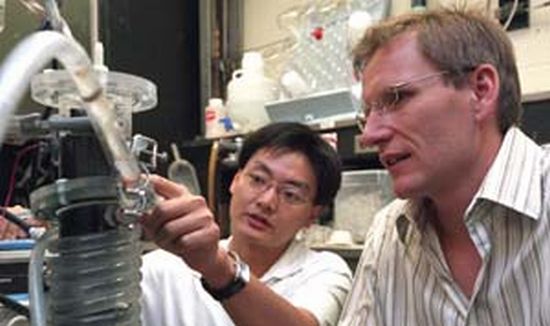
Researchers at Washington University in St. Louis are using a combination of beer, wastewater and microbes to demonstrate fuel-cell technology. Lars Angenent, Ph.D., assistant professor of Chemical Engineering, and a member of the University’s Environmental Engineering Science Program, has devised a microbial fuel cell which he calls an upflow microbial fuel cell (UMFC) that is fed continually and, unlike most microbial fuel cells, works with chambers atop each other rather than beside each other. He has received a $40,000 Bear Cub award from Washington University to develop the concept.
Using MFC technology, Angenent is treating wastewater donated by local brewery Anheuser-Busch, and in so doing creating electricity in a six-liter device a bit bigger than a large thermos. He uses a mixed medium containing thousands of organisms and optimizes environmental conditions to select for a bacterial community with improved electron transfer in anode biofilms, thereby increasing the electron transfer rate. In addition, he plans to work with a single-culture biofilm to allow a full understanding of how to use operating conditions to manipulate electron transfer in anode chambers.
Producing energy from wastewater should be a high international priority because of population growth and worldwide depletion of energy resources. Wastewater, with its high-content organic matter, also can produce methane and hydrogen fuels, however, that theoretically more readily usable energy can be produced when electricity is produced directly in a microbial fuel cell. A bioelectricity generating wastewater treatment system in just one large food-processing plant could power as much as 900 American single-family households.
Via: Ecotality




